If Iran Tests Israel, It Will Discover Its Long Arm – PM Lapid

Prime Minister Yair Lapid says Israel will continue to act in all areas against the revival of the Iran nuclear agreement and the threat posed by the Islamic Republic.

Prime Minister Yair Lapid says Israel will continue to act in all areas against the revival of the Iran nuclear agreement and the threat posed by the Islamic Republic.
During a visit to Nevatim airbase in southern Israel, which houses the Israeli Air Force’s squadron of F-35 fighter jets, he said it is too soon to know if Israel has succeeded in thwarting the looming nuclear agreement with Iran.
In a clear signal to Tehran, Lapid also issued a video message on the anniversary of Operation Orchard of September 6, 2007, when Israel destroyed Al Kibar site, a suspected nuclear reactor in the Deir ez-Zor region of Syria. Lapid reiterated “If Iran continues to test us, it will discover Israel’s long arm and capabilities.”
“We will continue to act in all fronts against terrorism and against those who seek to harm us," Lapid noted.
“As agreed between me and [US] President [Joe] Biden, we have full freedom of action to do whatever is appropriate to prevent Iran from the opportunity of becoming a nuclear threat,” Lapid added.
“It is still too early to know if we have indeed succeeded in stopping the nuclear agreement, but Israel is prepared for any threat and any scenario,” he added.
US Ambassador to Israel Thomas Nides said Monday that President Biden has assured Lapid that Washington will never tie Israel’s hands to defend itself against Iran. “We understand the aggression of Iran,” he said, adding that “[Biden] was very clear to the prime minister in that belief.”
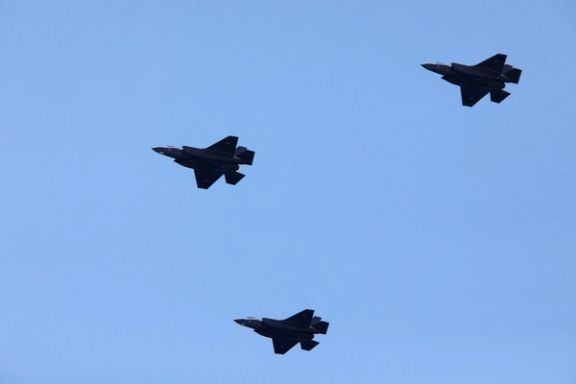
An Israeli air attack on Syria's Aleppo airport Tuesday has damaged the runway and taken it out of service, Syrian state media quoted a military source as saying.
The Israel missile attack was launched from the Mediterranean Sea, west of the coastal city of Latakia, at 8:16 p.m. local time (1716 GMT), the source said.
Syrian air defences intercepted Israeli missiles, downing several of them, the Syrian state news agency (SANA) claimed earlier on Tuesday.
It was the second reported attack in less than week. On August 31, Israel fired rockets at the airport, which resulted in material damage, according to Syrian state media.
Israel has intensified strikes on Syrian airports to disrupt Tehran's increasing use of aerial supply lines to deliver arms to allies in Syria and Lebanon including Hezbollah, regional diplomatic and intelligence sources told Reuters.
The Ukraine war and Russia’s distraction has given a freer hand to Israel to attack targets in Syria. Since mid-2017, Israel has launched hundreds of air strikes against Iranian arms supplies and positions.
Tehran has adopted air transport as a more reliable means of ferrying military equipment to its forces and allied fighters in Syria, following disruptions to ground transfers.
Last week's attack damaged Aleppo airport just before the arrival of a plane from Iran, a commander in an Iran-backed regional alliance who was familiar with the incident told Reuters.
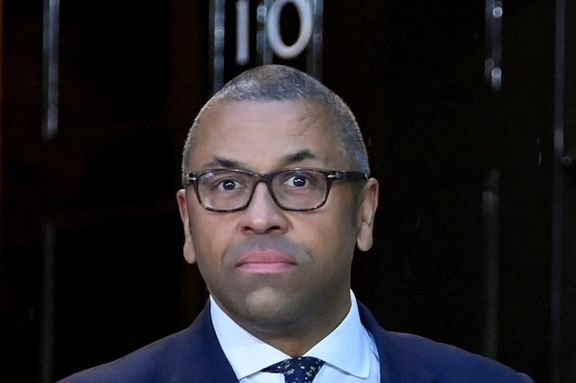
Britain’s new foreign secretary, James Cleverly, appointed today by new prime minister Liz Truss, held the Middle East brief at the foreign office 2020-22.
As minister of state for the Middle East, Africa and North America until February, Cleverly has direct experience of dealing with Iran. Three months after President Ebrahim Raisi took office, Cleverly met November 2021 in London with Ali Bagheri Kani, a deputy Iranian foreign minister and lead nuclear negotiator.“The new government coming in did give us an opportunity to reset,” Cleverly told Sky News later, in March 2022.
While Cleverly said immediately after the meeting he had urged Iran to return to the 2015 nuclear deal, his meeting with Bagheri-Kani seems to have centered on detained dual British-Iranian nationals Nazanin Zeghari-Ratcliffe and Anoosheh Ashoori. Families of the detainees and many analysts refused to believe claims by both Tehran and London that the detentions were not formally linked to Britain’s failure to honor a £400 million ($460 million) debt owed Iran for failure to deliver weapons in the 1970s that Tehran had paid for up front.
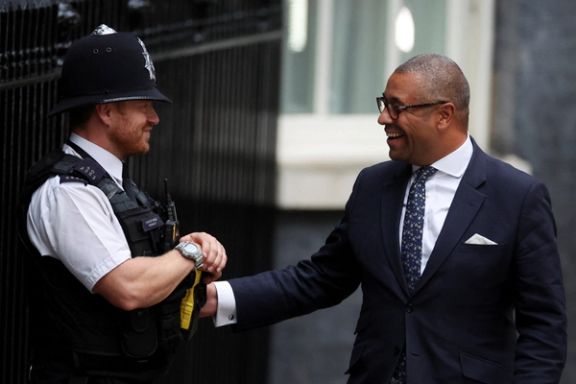
On the release of Zeghari-Ratcliffe and Ashoori in March 2022, Cleverly, still a minister of state but no longer covering the Middle East, said talks had been “incredibly difficult” and that London had taken “every precaution” that the £400 million would be used for ‘humanitarian’ purposes.
"There was a legal decision which went against the UK, and we abide by that legal decision, but there were practical difficulties,” Cleverly said. “You can't just write a cheque because of all those sanctions, because of all those counter-terrorism and counter-money laundering laws.”
He floated the idea that the talks over the debt repayment and prisoner release could set a wider precedent: “I would hope that Iran sees that a shift in their behavior can bring about positive changes, but ultimately, they are the ones responsible for this. And if they were to change their behavior, then the international posture towards them could be reviewed.”
Cleverly also insisted that Britain was working hard to secure the release of a third detainee in Iran, Morad Tahbaz, who holds US as well as British and Iranian nationality.
While some commentators have suggested Liz Truss may take a harder line towards Iran than her predecessor Boris Johnson, Truss’ long record of pragmatism suggests she may try to maintain a common approach with the Biden administration, France, and Germany. Cleverly, a strong Truss supporter who first joined the cabinet in only 2019 and currently education secretary, seems a ready ally in such an approach.
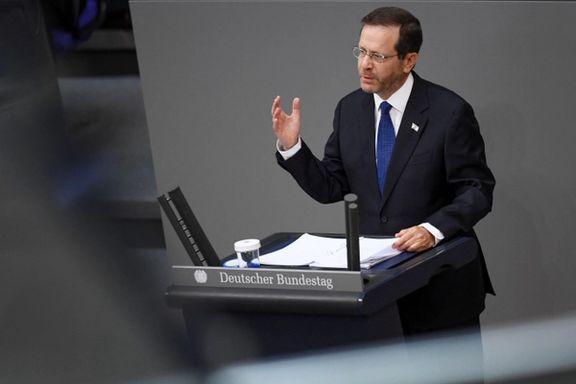
Israel’s president has addressed the German parliament, urging the legislators to stop the looming deal with Iran that threatens Israel and denies the Holocaust.
During his speech in the Bundestag on Tuesday, Isaac Herzog called the Islamic Republic “ineligible for concessions, under any circumstances,” and warned of “dark forces of hate, led by Iran” that threatens both Israel and stability in the Middle East, calling on the international community to stand on the “right side of history.”
Iran is behind “radical forces sowing terror, grief and devastation and seeking to menace everyone in the world,” he added, saying, “The possession of weapons of mass destruction by a UN member state that calls on a daily basis for the annihilation of another UN member state is simply inconceivable. Threats and endeavors to annihilate Israel are inconceivable.”
Following his meeting with German President Frank-Walter Steinmeier in Berlin, Herzog said “Iran is openly striving for Israel’s destruction, and the international community must treat it severely, firmly and assertively. Toothless and watered-down accords and sweeping benefits will not stop Iran.”
Reiterating that Iran “has proven that it cannot be trusted,” he said that Israel “will stand up and assertively and powerfully defend its citizens and Jewish communities all around the world. We expect our allies to stand firmly by our side at this hour.”
Germany is one of the main world powers currently negotiating the revival of the 2015 nuclear deal as an agreement is seen likely in the next few weeks despite persistent gaps between Tehran and Washington.

While Iran’s insistence on its demands has cast doubts on a quick revival of the 2015 deal, the country’s nuclear chief spoke of building more nuclear energy plants.
Addressing a conference on the exchange of modern energy technologies on Tuesday, the head of the Atomic Energy Organization of Iran (AEOI) said Tehran pursues the “open door policy” and seeks to become a hub for designing and building nuclear power plants.
Mohammad Eslami added that “We intend to provide various services in the field of nuclear technology, including the development of nuclear power plants and nuclear power generation,” the he said, claiming that the country plans to convert 20 percent of its energy portfolio into nuclear power.
Eslami had earlier said that Iran plans to invest $50 billion for building new nuclear power plants, noting that the new power plants will be able to generate 10,000 megawatts of electricity, still far from the country’s total need.
For decades, Iran has neglected investment in other sources of power, especially renewables, making it almost impossible to bounce back in the foreseeable future, considering its isolation in the global community. Currently Russia is the only country cooperating with Iran in the nuclear industry.
Commissioned by Russia in 2011, Iran's Bushehr power plant has one operational unit that generates 1,000 megawatts, providing less than two percent of the country’s electricity. In July. Eslami said construction projects for phase two and three of the Bushehr Nuclear Power Plant have accelerated since a few months ago.
Russia says it received the needed assurances from the United States that sanctions for its invasion of Ukraine should not impact implementation of a revived nuclear deal, the JCPOA. If finalized, the renewed deal lets Russia cash in on a $10-billion contract to build atomic reactors in Iran.
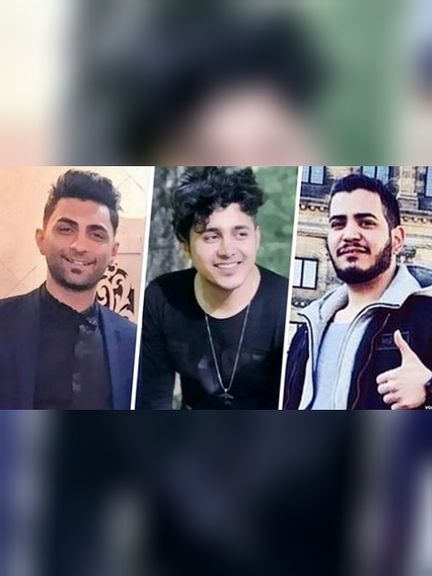
The attorney of three young protesters who were sentenced to death for participation in the bloody uprising in 2019 says a court has reduced their death sentences to imprisonment.
Babak Paknia said in a tweet on Tuesday that his clients Amir Hossein Moradi, Saeed Tamjidi, and Mohammad Rajabi, all under 30 years of age, have now been sentenced to five years behind bars.
Iran’s supreme court had confirmed the death sentences, but after reconsideration another court had earlier revised the decision to life imprisonment.
Paknia had earlier said that during the trial, the defense attorney was not allowed to participate in the process and a notorious judge, Abolghasem Salavati finally sentenced them to death. Judge Salavati, also known as the “hanging judge” among Iranian activists, was sanctioned by the United States for violations of human rights and “unfair trials in Iranian Kangaroo courts.”
Moradi, Tamjidi and Rajabi were reportedly subjected to torture during interrogation to obtain forced confessions, and the judiciary had said they were linked to the exiled Albania-based opposition group Mujahideen-e Khalq (MEK).
According to some reports, in the "bloody November" of 2019 at least 3,000 protesters were killed by the Islamic Republic’s security forces and nearly 20,000 were arrested. Earlier estimates ranged from 300 to 1,500 civilians killed nationwide. The protests were the most widespread against the regime since its establishment in 1979, and the internet outage gave security officials the opportunity to commit mass killings amid a news blackout for about 10 days.